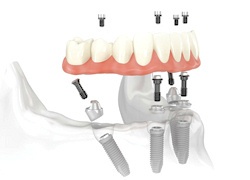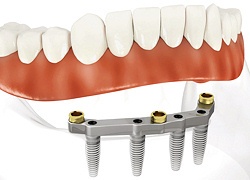What are Dental Implants
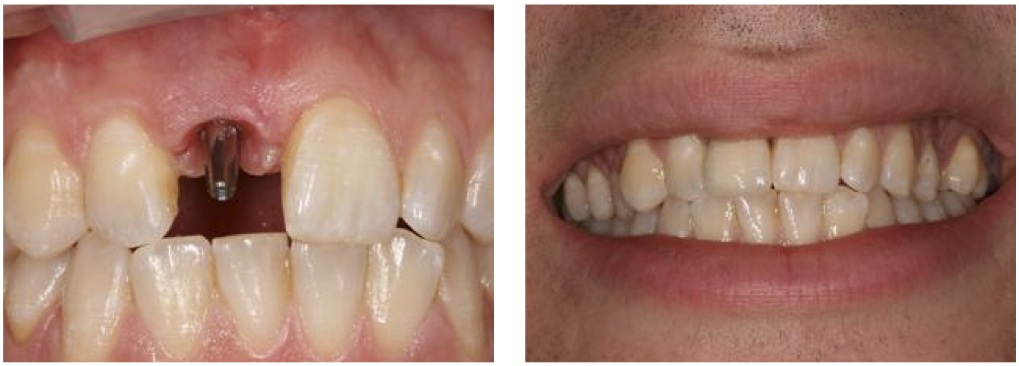
Implants are titanium screws that are placed into the bone of the upper or lower jaw. They serve as man-made substitutes for the root portion of lost natural teeth and act as an anchor for replacement teeth. Dental implants can be used to replace a single lost tooth or many missing teeth and to secure dentures.
Once the implant has been placed into the bone it takes 3-6 months for the bone to grow around the implant. Once this process is complete we can attach the new tooth or teeth.
Benefits of Dental Implants
Cause no damage to the other teeth or gums. Restore gaps in the front or back of the mouth with ‘teeth’ which look, feel, and function like the real thing. Keep your face looking younger after tooth loss. Fix dentures to stop any movement, or replace them completely. This helps to eliminate most of the key concerns of denture wearing and improves self-confidence.
Permanence and Reliability
Research and documented scientific studies have shown the effectiveness and long-lasting results of implants. You can rely on your new teeth to look, feel, and function like natural teeth for years to come. Dental implants are right for you-
Dental implants are appropriate for just about everyone. There is no concern over your age. If you are healthy then dental implants could be for you. Dental implants can replace one tooth, a group of teeth, or all your teeth. Implants can now be placed in the region of the sinus in the upper jaw.
Dental Implants: What are they?
A dental implant is a small screw-shaped attachment usually made from titanium. It is inserted into the jaw bone to take the place of a missing tooth root. Once the bone attaches firmly to the implant (Osseointegration), a replacement tooth can be secured to the top of the implant. The new tooth will generally be fitted to the implant 4 – 5 months later. This new tooth can look just like a natural tooth. Implants can also be used to support a bridge or a denture.
Implants that are secured or stabilized to replacement teeth are more comfortable than conventional dentures because there is no slipping or movement. This eliminates some of the key worries of dentures and improves self-confidence.
What is involved in the implant process?
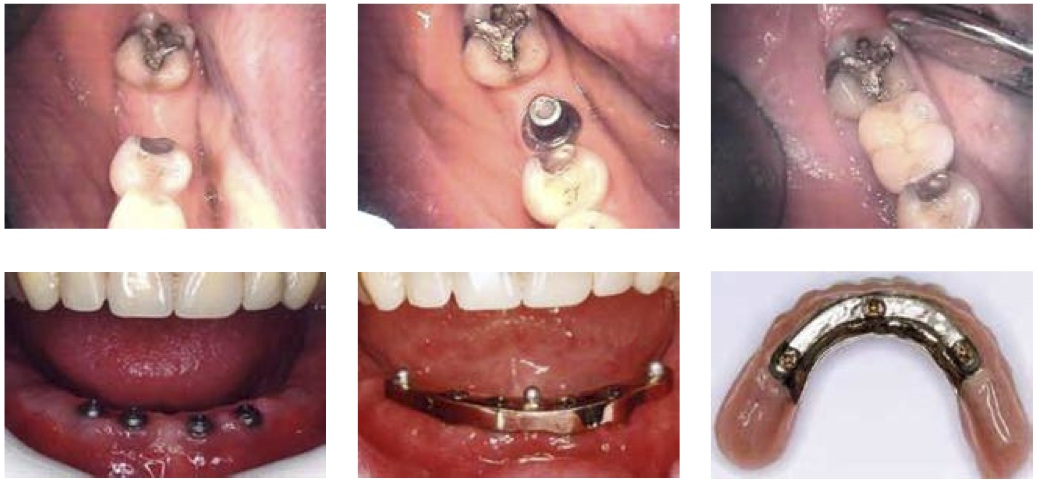
The implant process normally involves several steps that take place over a period of time from three to nine months. Although there are various methods used according to particular circumstances.
Below is a general idea of the appointments required to complete the treatment and what will happen at each stage.
The consultation
Consultation and treatment planning – A full mouth assessment, X-rays if necessary, a CT scan if necessary, impressions of your teeth to make models see how your teeth fit and work together. A full treatment plan letter with the costs. Clinical photographs. This is usually carried out at the first 2 appointments.
Next comes the implant placement appointment – This is a relatively minor surgical procedure. It is carried out using local anesthetic and if you are feeling anxious can be accompanied by some oral sedation – we use Temazepam. Procedures may vary slightly from one dental practice to another dependant on the dentist’s training.
All implants are placed under sterile conditions. Once the implant has been inserted into the bone the surgeon will then put some stitches in to help the gum to heal together and cover the implant. These stitches are dissolvable and can take up to a week to disappear completely.
The next appointment is usually around 2 weeks after the implant surgery and the purpose of this is for the surgeon to check the area where the implants have been placed and review the healing process.
The integration period
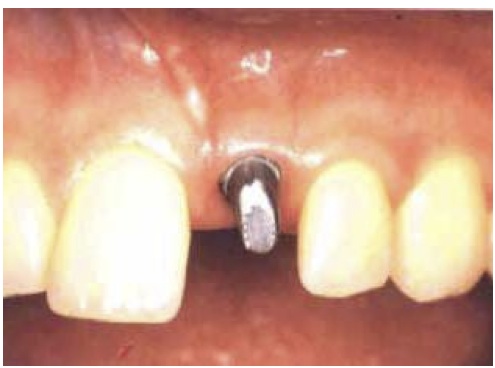
After this, you will usually have to wait for between 3 and 5 months for the implant and the bone to knit together. This is called the Integration period. During this time any gap that you have in your teeth will have a temporary bridge or denture to fill the space.
The restoration period
When you return 3- 5 months later you will begin the restorative phase which can take between 2 – 5 appointments and between 2- 8 weeks depending on the number of appointments required.
At the first appointment of the restorative period, the surgeon will expose the top of the implant. Next, they will take impressions of the tooth/teeth to send to the laboratory so that they can begin the process of making your Bridge, Crown or Denture.
The amount of appointments in the restorative phase varies mainly because of the number of teeth that need to be restored and the type of restoration you are having made. Different types of restorations need to go between the dentist and laboratory different amounts of time.
At the first appointment of the restorative period, the surgeon will expose the top of the implant.
Next, they will take impressions of the tooth/teeth to send to the laboratory so that they can begin the process of making your Bridge, Crown, or Denture.

When making a crown or bridge to go on top of your implant/implants the final restoration will either be screw-on or it will be cemented in.
2 stage implantation versus 1 stage
Dental Implants can be categorized based on many different things – by size, by the material used, by type of connection on top of the head of the implant and by the stages of the treatment, the last one being the most common. Based on the stages of the treatment, Dental Implants are divided into:
Two-Stage Dental Implants vs
One Stage Dental Implants
It is generally recommended to go through 2 stage implantation procedure as a way to have a safer approach. After the first stage is completed and the implant is implanted it takes a 3-5 month period for the implant to ingrow into your jawbone. and only after 3-5 month the patient can have the crown installed on the implant. There are risks if the crown installed on the implant right after. Namely, the implant may not be well accommodated in the jaw bone and an infection might take place as one of the risks. Results very much depend on bone density and the type of implants are used.
One Stage and Two-Stage Dental Implants can be equally successful if the placements performed correctly.
Only one additional surgical intervention is required if the 2 stage procedure has been chosen, which makes the 1 stage procedure less time consuming and cost-effective. A review was recently able to confirm that a 1 stage implant procedure is as effective as the 2 stage procedure, and also offers the following advantages:
One minor surgical intervention can be avoided
The treatment time can be shortened
Five studies conducted with 239 patients were able to prove that both procedures are equally effective and successful, but the one-stage dental implants procedure is advantageous as there is one less surgery and the treatment and recovery time are significantly shorter.
What Dental Implants Systems do we work with?
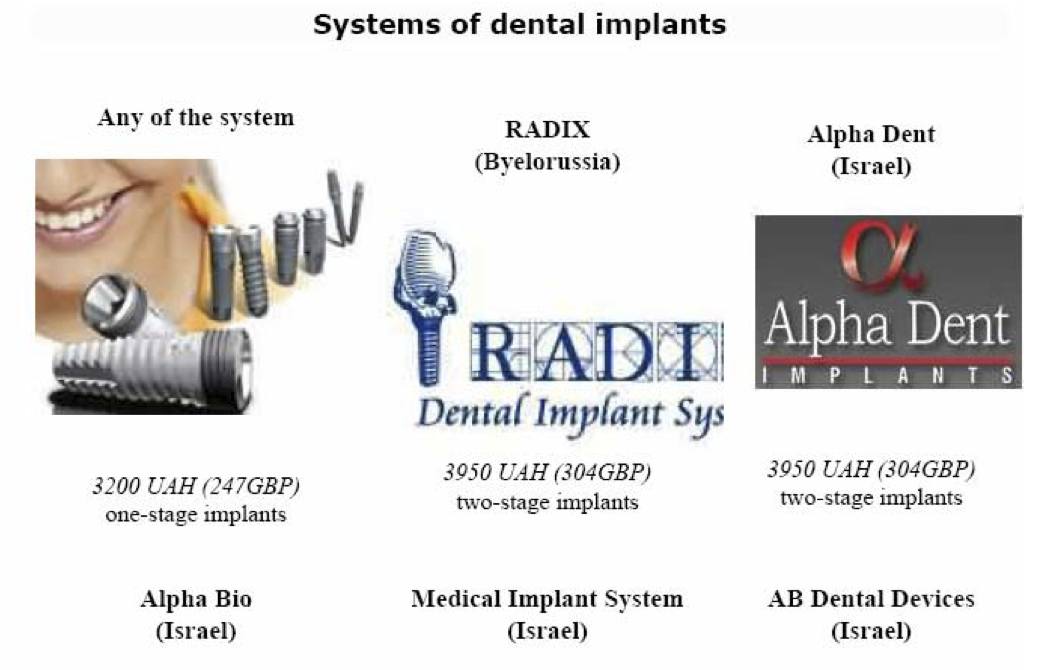
FAQ:
Implants Is dental implant treatment painful?
Patients are often surprised at how little discomfort they experience during and after implant procedures.
Patients are often surprised at how little discomfort they experience during and after implant procedures.
How long will I be out of action after I have had the procedure?
This does vary on the number of implants you have and whether you opt for oral sedation. We usually recommend that you clear your diary for 48 hours after the procedure.
Will I be able to eat what I want afterward?
Once treatment is completed, you should be able to eat a normal, healthy diet with little or no difficulty. Most patients go on to eat a normal meal the day after surgery. It is recommended that you clean the area thoroughly after eating.
How long will a dental implant take?
A range of treatments is available. Usually, treatment requires a series of appointments spread over several months. Occasionally implant treatment can be undertaken and completed in a much shorter period, possibly in a day.
For how long do I have to stay in town if came for 2 stages implantology for the first visit?
3-5 days should be enough, from which 1st day spends on preparation, second on the surgery to the implant, the rest of the days to observe whether the surgery has no side effects such as inflammation.
How long will my implant last?
Once treatment is completed, a routine of careful dental hygiene and regular dental check-ups should ensure that implants last for many years.
Am I too old for implant treatment?
There is no upper age limit for patients to undergo implant treatment, provided they continue to enjoy good general health.

